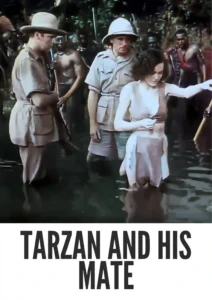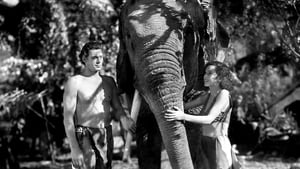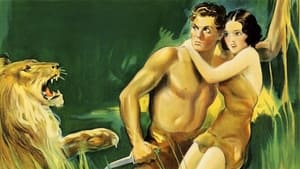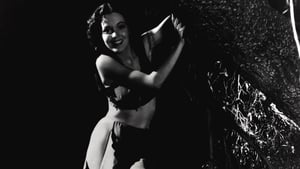Contact: info@alwanfilm.com
Video Sources 0 Views
- Watch trailer
- Tarzan and His Mate


Synopsis
Table of Contents
ToggleReview: Tarzan and His Mate 1934 Full Movie – A Jungle Epic Brought to Life in Vibrant Color

Introduction
“Tarzan and His Mate” (1934) stands as a thrilling testament to the enduring allure of adventure and romance in the heart of the jungle. In this review, we’ll explore the significance of this early colored film, examining its impact on audiences and its lasting legacy in the realm of action-adventure cinema.
Check The Full Colorized Movies List
Check Our Colorized Movies Trailer Channel
Understanding Tarzan and His Mate 1934 Colorized: Director, Cast, and Genre
Directed by the visionary Cedric Gibbons, “Tarzan and His Mate” (1934) showcases his mastery of visual storytelling and world-building. The film features a stellar cast, including Johnny Weissmuller and Maureen O’Sullivan, whose on-screen chemistry brings the iconic characters of Tarzan and Jane to life with palpable intensity. Blending elements of action, romance, and drama, “Tarzan and His Mate” (1934) transports viewers to a world where danger lurks around every corner and love knows no bounds.
Exploring the World of Tarzan and His Mate 1934 Colorized: Plot and Characters
At its core, “Tarzan and His Mate” (1934) follows the epic journey of Tarzan and Jane as they navigate the untamed wilderness of the jungle and confront the perils of the unknown. As they encounter hostile tribes, treacherous predators, and rival adventurers, they must rely on their wits, strength, and unwavering love for each other to survive. Along the way, they forge friendships with native allies and form bonds that transcend language and culture, proving that the human spirit knows no boundaries in the wilds of Africa.
The Art of Film Colorization
Film colorization serves as a transformative tool that enhances the visual experience of classic movies, breathing new life into timeless stories and captivating audiences with vibrant hues. By digitally adding color to black and white films, colorization allows viewers to immerse themselves in the rich tapestry of cinematic worlds, exploring every nuance and detail with fresh eyes and renewed appreciation.
Early Colored Films: A Brief History
The history of colored films traces its roots back to the early days of cinema, with filmmakers experimenting with various techniques to add color to their creations. From hand-tinted frames to early Technicolor processes, the evolution of colored film has been marked by innovation and ingenuity, paving the way for the development of modern colorization techniques that continue to captivate audiences to this day.
Tarzan and His Mate 1934 and Its Early Colored Version
The decision to release “Tarzan and His Mate” (1934) in a colorized format was met with both excitement and trepidation. While some welcomed the opportunity to experience the film in vibrant color, others expressed concerns about the potential impact on its visual aesthetic. Nevertheless, the early colored version of “Tarzan and His Mate” (1934) offers viewers a fresh perspective on the timeless tale of adventure and romance, enhancing its emotional resonance and captivating audiences with its luminous beauty.
The Debate Over Film Colorization
The debate over film colorization continues to divide audiences and critics alike, with proponents praising its ability to breathe new life into classic movies and introduce them to a new generation of viewers, while detractors argue that it compromises the artistic integrity of the original work and diminishes its historical significance. As the debate rages on, filmmakers and audiences alike are left to ponder the merits and drawbacks of colorization in the ever-evolving landscape of cinema.
Examining Tarzan and His Mate 1934 as an Early Colored Film
As with any colorized classic, the impact of colorization on “Tarzan and His Mate” (1934) is a matter of personal interpretation. Some may argue that it enhances the film’s visual appeal and immerses viewers in its world, while others may feel that it detracts from the stark beauty of the original black and white version. Regardless of one’s stance on the issue, there’s no denying the enduring power of “Tarzan and His Mate” (1934) as a timeless jungle epic that continues to capture the imagination of audiences around the world.
Influence and Legacy: Tarzan and His Mate 1934 Colorized’s Impact on Cinema
“Tarzan and His Mate” (1934) has left an indelible mark on the world of cinema, inspiring countless filmmakers and captivating audiences with its timeless tale of adventure and romance. From its breathtaking cinematography to its groundbreaking special effects, the film continues to resonate with viewers of all ages, reaffirming its status as a beloved classic of the action-adventure genre.
Director’s Cinematic Legacy: Beyond Tarzan and His Mate 1934 Colorized
Cedric Gibbons’ influence extends far beyond “Tarzan and His Mate” (1934), with a diverse body of work that continues to captivate audiences around the globe. From “The Wizard of Oz” to “An American in Paris,” Gibbons’ films are celebrated for their visual splendor, imaginative storytelling, and timeless appeal, solidifying his legacy as one of the preeminent directors of Hollywood’s Golden Age. Through his groundbreaking work, Gibbons has left an indelible imprint on the world of cinema, inspiring generations of filmmakers to follow in his footsteps.
Themes Explored in Tarzan and His Mate 1934 Colorized
“Tarzan and His Mate” (1934) explores a myriad of themes, from the untamed beauty of the jungle to the enduring power of love and loyalty. Through its richly drawn characters and breathtaking set pieces, the film invites viewers to ponder the complexities of the human condition and the timeless truths that bind us together. As audiences immerse themselves in the world of “Tarzan and His Mate” (1934), they are reminded of the universal values of courage, compassion, and resilience that transcend language and culture.
Reception and Controversy Surrounding Tarzan and His Mate 1934 Colorized
Upon its release, “Tarzan and His Mate” (1934) received widespread critical acclaim, with many praising its groundbreaking special effects, breathtaking cinematography, and electrifying action sequences. However, the decision to release the film in a colorized format sparked debate among purists, reigniting the age-old discussion surrounding film preservation and artistic integrity. Despite the controversy, “Tarzan and His Mate” (1934) remains a beloved classic that continues to resonate with audiences of all ages, reaffirming its status as a timeless masterpiece of the action-adventure genre.
Where to Watch Tarzan and His Mate 1934 Colorized Online
For those eager to experience the timeless magic of “Tarzan and His Mate” (1934), the film is readily available on popular streaming platforms such as Netflix, Amazon Prime, and Hulu. Whether you choose to watch it in its original black and white format or the early colored version, “Tarzan and His Mate” (1934) promises to transport you to a world of excitement and wonder, where danger lurks behind every tree and love conquers all in the heart of the jungle.
FAQs About Tarzan and His Mate 1934 Colorized
Q: Is “Tarzan and His Mate” (1934) based on a true story? A: No, “Tarzan and His Mate” (1934) is a fictional tale inspired by the iconic character of Tarzan, created by author Edgar Rice Burroughs. While the film incorporates elements of adventure and romance, its characters and plot are products of the screenwriter’s imagination rather than historical documentation.
Q: Who are the main actors in “Tarzan and His Mate” (1934)? A: “Tarzan and His Mate” (1934) features Johnny Weissmuller and Maureen O’Sullivan in the lead roles of Tarzan and Jane, respectively. Their on-screen chemistry and dynamic performances bring the iconic characters to life with authenticity and passion, captivating audiences with their thrilling adventures in the heart of the jungle.
Q: What awards did “Tarzan and His Mate” (1934) win? A: While “Tarzan and His Mate” (1934) did not win any major awards, it remains a beloved classic of the action-adventure genre, praised for its groundbreaking special effects, breathtaking cinematography, and timeless storytelling.
Q: Why was “Tarzan and His Mate” (1934) released in a colorized format? A: The decision to release “Tarzan and His Mate” (1934) in color was made to introduce the film to a new generation of viewers and enhance its visual appeal for modern audiences. While the choice to colorize the film sparked debate among purists, it ultimately allowed “Tarzan and His Mate” (1934) to reach a wider audience and ensure its continued relevance in the annals of cinematic history.
Conclusion
As we journey through the untamed wilderness of the jungle and the hearts of its fearless characters, let us remember the enduring legacy of “Tarzan and His Mate” (1934) and its timeless message of love, loyalty, and adventure. Whether experienced in its original black and white format or the early colored version, the film continues to captivate audiences with its thrilling action, breathtaking romance, and unforgettable characters.
So, whether you’re a seasoned cinephile or a curious adventurer, take a moment to revisit “Tarzan and His Mate” (1934) and experience the magic of the jungle as never before. For in the timeless tale of Tarzan and Jane, you’ll find a treasure trove of excitement and wonder that will stay with you long after the credits roll.
















